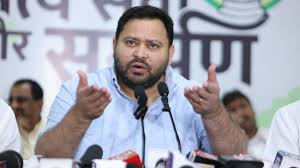Tejashwi targets electoral roll revision exercise — ‘Ruining Bihar’s roti-beti ties with Nepal’

In a fierce political escalation, Rashtriya Janata Dal (RJD) leader Tejashwi Yadav has raised sharp objections to the Election Commission’s (EC) Special Intensive Revision (SIR) of electoral rolls in Bihar. According to him, the revision process is not just a bureaucratic formality but a deliberate attempt to undermine the cultural and emotional ties between Bihar and Nepal—relationships that have historically been preserved through “roti-beti” (bread and daughter) bonds, symbolizing intermarriages and familial closeness across the open border.
What Is the SIR and Why the Row?
The Election Commission began the Special Intensive Revision on June 25, 2025, with the aim of cleaning up Bihar’s voter list ahead of the 2025 Assembly elections. Officials claimed that they had discovered a “large number” of entries involving individuals allegedly from Nepal, Bangladesh, and Myanmar, using fake Indian documents to register as voters.
The final voter list is scheduled to be published on September 30, 2025, but the mid-process revelations sparked outrage—especially from the opposition.
Tejashwi Yadav denounced the move as “politically motivated,” questioning the timing and urgency of such a major overhaul, barely two months after the 2024 Lok Sabha elections.
“The voter list used in the recent general elections was fine then, but suddenly the EC finds it suspicious? Why now?” he asked, raising eyebrows.
“Sootra Ko Mootra Samajhte Hain” — Tejashwi’s Sharp Words
Reacting to media reports quoting unnamed “sources” (or sootra) within the EC or administration, Tejashwi lashed out in his signature sarcastic style:
“Sootra ko hum mootra samajhte hain” (We consider sources to be urine), he said, mocking what he called “unverified and politically-driven leaks.”
His choice of words drew immediate condemnation from BJP leaders and even some neutral observers, who termed it “crude” and “disrespectful.” BJP MP Sanjay Jaiswal slammed the comment, calling Tejashwi “uneducated” and demanding a public apology for undermining the Election Commission’s integrity.
Cultural Ties Under Attack?
At the heart of Tejashwi’s criticism lies a deeply emotional argument—that the voter list revision risks erasing the cultural and familial links between Bihar and Nepal. For centuries, people in border districts like Sitamarhi, Madhubani, and West Champaran have intermarried with families across the Nepali border. They travel frequently, celebrate festivals together, and treat each other not as foreigners, but kin.
“If you start labeling every person with Nepali ancestry as ‘illegal,’ you are questioning our daughters’ homes. You are tearing apart generations of trust,” said Tejashwi during a press briefing in Patna.
The open border between India and Nepal is a unique global arrangement that allows free movement of people without visas or passports. Several communities in Bihar and Nepal share linguistic, religious, and economic ties. Critics argue that the voter list exercise fails to consider this historical context.
EC’s Stand and Allegations of Foreigners
The Election Commission, however, has maintained that the revision is standard procedure. Officials say the presence of foreign nationals with fake documents is a matter of national concern. According to EC sources, the field teams found significant numbers of suspected illegal entries in border areas, particularly among Nepali, Bangladeshi, and Rohingya communities.
“It is not about hurting relations, it’s about ensuring that the democratic process isn’t hijacked by non-citizens,” said an EC official.
They also claim that the EC had received intelligence inputs from central agencies flagging the possibility of electoral fraud through cross-border fake registrations.
A Broader Political Agenda?
Tejashwi has alleged that the entire exercise is a ploy by the BJP to suppress the votes of poor, marginalized communities—many of whom lack proper documentation despite being Indian citizens.
“You don’t need a foreign passport to be targeted,” he said. “In the name of ‘revision,’ poor Mahadalits and minorities will be removed because they have no paperwork.”
He also questioned why such drastic measures were not seen in BJP-ruled states with similar cross-border or migrant populations. This, he said, exposes the selective nature of the exercise.
The BJP, however, hit back, accusing Tejashwi of fearmongering and protecting vote banks. Party leaders claimed that national interest must come above “sentimental arguments.”
“Why is he so rattled by illegal names being removed? Is he worried his party will lose phantom votes?” asked BJP spokesperson Nikhil Anand.
The Nepali Reaction
Although Nepal’s government has officially remained silent, many Nepali social commentators and former diplomats have voiced concern over the rhetoric used. “Roti-beti ties are sacred. We hope no action from the Indian side will disturb our people-to-people relationships,” said a former ambassador.
What’s at Stake in Bihar?
With Assembly elections less than a year away, every vote counts. The state has a history of tight electoral contests where even a few thousand votes can shift the balance of power. If the SIR ends up removing lakhs of names, the political landscape could be dramatically altered.
Bihar’s voter population includes a large number of migrants, border residents, and economically poor voters, many of whom may struggle to provide the “correct documents” demanded during door-to-door verification.
Conclusion: Bureaucracy vs. Belonging
The voter list revision has now turned into a high-stakes confrontation between bureaucratic procedures and human connections. While electoral integrity is non-negotiable, ignoring the socio-cultural landscape of a region like Bihar can lead to alienation and distrust.
Tejashwi Yadav has tapped into this emotional undercurrent, portraying the exercise as not just a political maneuver but a threat to Bihar’s identity and history.
As the EC moves toward publishing its final voter list by September 30, the real test will be whether it can balance security and sensitivity—ensuring fair elections while preserving Bihar’s unique social fabric.






